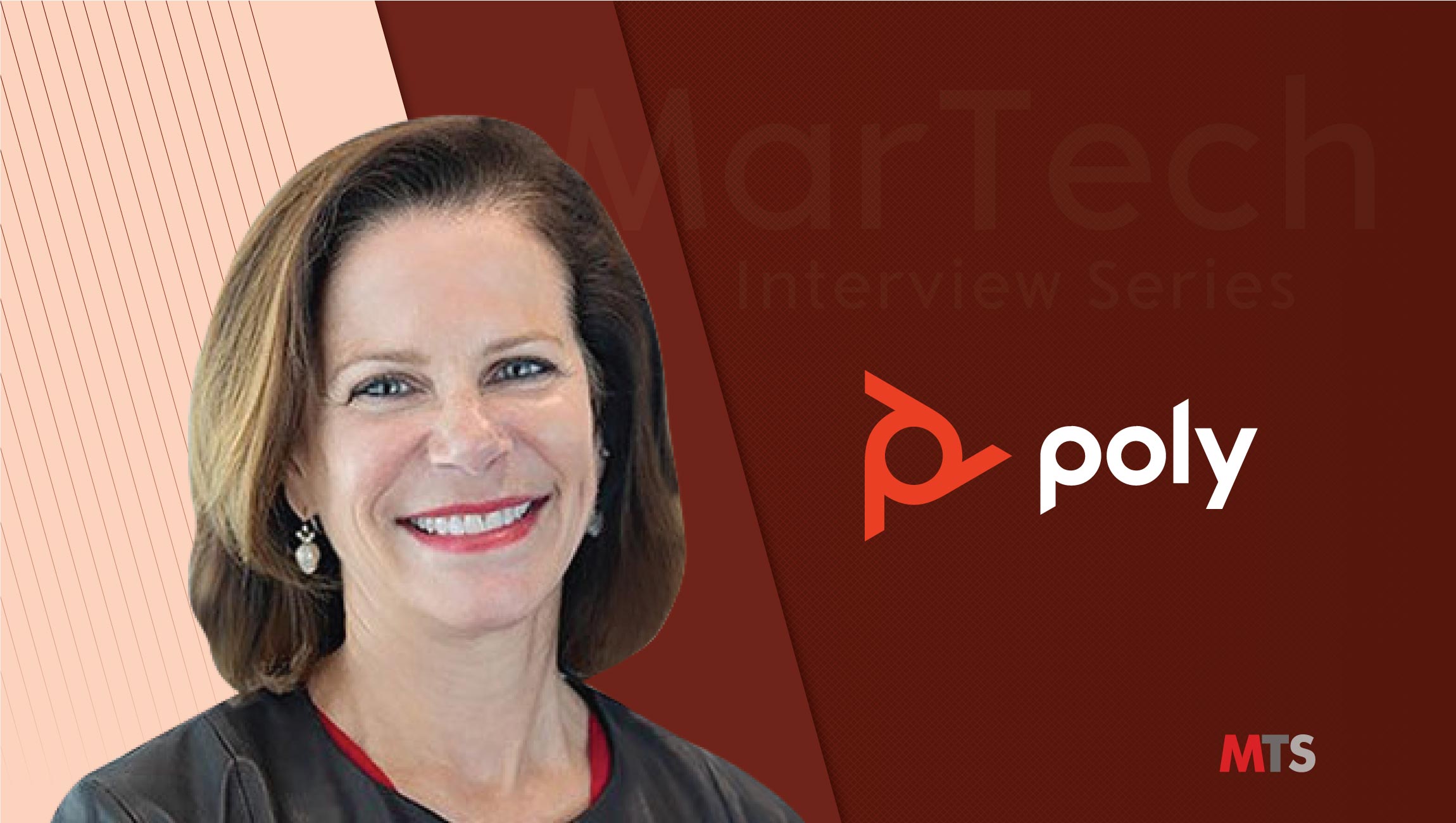“Voice and Video technology have reached the point where it’s no longer mandatory to require everyone to be in the same office.”
[/vc_wp_text]
Journey into Tech
Hi Amy, please tell us about your role and journey into Technology. What inspired you to take up the role at Poly?
It was an interesting route. For about 16 years I held various Marketing positions at Microsoft, eventually becoming a General Manager in their Server and Tools Marketing Group. I spent a couple of years as a Vice President at HP. Then in 2015, I began a three-year stint as at Polycom, first as VP of Solutions Marketing, then as CMO.
When Plantronics acquired Polycom in 2018, I became the EVP and CMO of the new combined company. I was inspired to stay on in part because of the challenge of building the image of a tech company from scratch.
You are one of the most-active women CMOs in the industry. What are the most unique challenges you face in your industry and at your workplace? How do you tackle these?
I’ve become known as a CMO that manages transitions well. I use my expertise in this area to manage change. Change is happening across the Unified Communications industry, with the rise of huddle rooms and remote working.
It’s happening at Poly with our rebrand, refreshed products and a move into the huddle room space. And change is happening on our team as we seek to be more and more integrated with the rest of the company to deliver strong results.
Tell us how you work with technology. What Marketing, Sales and Messaging tools do you use for your business?
Our Marketing operations team has a robust stack of Marketing tools that we make available to our team. We made the decision to centralize our Global Marketing to enable Marketing Process Automation, Performance Measurement, and Customer Insights wherever possible. So now we have people dedicated to deploying the best tools in the industry. I myself love data and find myself diving into the metrics as much as possible.
As far as specific technologies, we have over 100 that are essential to running Marketing efficiently and effectively. Our primary MarTech platforms are major components of the Adobe Marketing Cloud/Marketo, Integrate, Salesforce Social Hub, LinkedIn Elevate, Workfront, Allocadia, ON24, and SurveyMonkey. We then use Microsoft PowerBI for aggregating data for Marketing performance measurement and executive dashboards. Many of our solutions are integrated with our primary Sales platforms like Salesforce CRM/Service Cloud and LinkedIn Navigator. We also leverage many enterprise collaboration and productivity tools like Microsoft Office 365, Microsoft Teams and Zoom.
You have been part of many tech companies, heading their Marketing and Product Management. What did you learn from these roles and how do you apply experiences in your current role at Poly?
I learned to be flexible, which came in handy when my company was acquired and underwent a series of monumental shifts, from identity and culture to telling the world who we are and who we want to be. Some of that I certainly learned at Microsoft, where “comfort with ambiguity” was a core competency we actively developed.
Poly underwent a rebranding process last year. How has it impacted your Sales and Marketing campaigns internally?
The rebranding was a part of everything we did. We took care of the employees of our newly joined companies by keeping them informed and giving them sneak peeks as we literally counted down to our relaunch. Every part of our business is designed to build on both companies’ strengths and facilitate growth. Now, to be fair, we have to be extra diligent to make sure that we continue to educate partners and customers on just who Poly is – so we use every opportunity to say that Plantronics + Polycom are now Poly.
How much has the CMO’s role evolved in the modern Digital Era? What is the Future of a tech CMO?
The role of a CMO is constantly changing. I think that’s true for any industry, but even more so for tech, because of the pace of change. We constantly have to be on the lookout for the best ways to get information about our products out to the world. I hear a lot about CMOs becoming more about customer experience overall – not just the “brand” or “advertising” leader – and that means we have to really understand not just what we can measure, but also the story behind those data. Nothing replaces meeting with and listening to our customers.
When you look back into the past, which Marketing Technology platforms and tools do you really miss having or working with?
I don’t know if there’s a particular technology that I’m nostalgic for – does anyone really miss fax machines? But I do fondly recall my first experiences with spreadsheets, and how they seemed to me to be purely magical.
Customer Success and Experiences
Tell us something that fascinates you the most about creating opportunities for Poly’s customers. Which industries and titles subscribe to your enterprise communications solutions?
What fascinates me most about creating opportunities for Poly customers is the many ways that better, more collaborative and visual interactions affect both the work experience and the bottom line. For example, we have schools that use our video options to have guest speakers visit classrooms, without the expense and hassle of travel. Our noise-canceling headsets help different types of workers coexist in the same office environment. We also see that the buying teams we talk to increasingly include facilities and HR as well as IT.
How does your global Marketing team analyze diverse regions for optimized operations and revenues?
We optimize our operations to cater to a global-to-regional-to-local Marketing motion. We have centralized teams that can develop strategies and provide executional services that benefit top-tier regions by balancing subject matter expertise with market expertise. On the flip side, local markets then feed market drivers and local performance metrics back into the global teams so that we can continue to evolve, keeping our focus on bolstering the activities that work, and minimizing those that obtain lesser results.
What drives the current competition in the ‘Data Economy’? How do you see Data-based Marketing and Branding evolving with the maturity of other digital channels, especially Video and Social Media?
I see data as the targeting scope and channels as the bow and arrow. The more data we have, the more we know about our targets: Are we aiming in the right direction? Are we hitting the most effective spots? We do need to be careful – “pinpoint Marketing” can have a downside, I think. You may find the person who wants to buy right now, but you’re not going to see the people you want to influence or to inform who may the buyer you want next year or the influencer that today’s buyer relies on for advice. The biggest challenge is the breadth of options: Science has taught us that too many choices can often result in a decision to do nothing.
Insights and Predictions
One epic moment from the decade (2011-2019) that changed your outlook into the tech landscape –
I don’t think any of us recognized the moment at the time, but the launch of iPhone 4 helped shape the tech landscape of the whole decade. It had a slim form factor, hi-res display, included FaceTime and the system’s first front-facing camera. This phone didn’t invent selfies, but it certainly helped facilitate them.
We’re all still dealing with (reeling from?) the effects of millions of people pointing a camera at themselves. Beyond that, just putting your phone and your digital camera into the same package has changed how we share information. Before that, nobody really saw enough photos of my dogs on a day-to-day basis. (Yes, they are exceptionally cute.)
What are your predictions for your industry and technology markets for 2020-2024?
First, I think the trend toward open offices will continue, though companies will realize the need to also invest in huddle rooms and other such spaces to help employees escape from the din. Second, I think remote working will continue to be accepted and embraced as a norm.
Voice and Video technology have reached the point where it’s no longer mandatory to require everyone to be in the same office. And finally, I see AI continuing to grow in importance. Assistants like Siri and Alexa will evolve, but AI will show up in more subtle ways – some of Poly’s video bars automatically adjust the volume for different speakers, or they know to zoom in on the person who’s speaking.
What startups in the technology industry are you watching keenly right now?
One company that has caught my eye is Clinc, a leader in Conversational AI. They’re all taking the world’s most advanced AI technology and turning it into solutions that are improving the quality and reducing the complexity of life. I’m also intrigued by Guidespark, who have taken the notion of Marketing Automation to drive a deal and turned it on its head to create a tool for driving culture change inside companies. We know culture eats strategy for lunch, so it’s great to see a team tackling this problem.
I’m also fascinated by many startups looking at autonomous driving and advancements in industrial IoT that ultimately will help us address climate change in very material ways.
Tag the one person (or more) in the industry whose answers to these questions you would love to read:
Robin Matlock, Heidi Melin, Laura Goldberg, Robin Saitz, Leo Tucker, Tracy Hansen
Thank you, Amy! That was fun and hope to see you back on MarTech Series soon.
Amy Barzdukas serves as Executive Vice President and Chief Marketing Officer at Poly. In this role, she is responsible for Poly’s global marketing strategy and execution.
Barzdukas joined Poly in 2018 following the company’s acquisition of Polycom and has more than 20 years of experience in the technology industry. She joined Polycom in 2015 as Vice President of Global Solutions Marketing and was promoted to Executive Vice President and Chief Marketing Officer in 2017.
Prior to joining Polycom, Barzdukas served as Vice President of Worldwide Marketing for HP’s Business Personal Systems group and had a successful 16-year career at Microsoft with multiple leadership and general manager roles, including General Manager of Competitive Marketing Strategy and General Manager Marketing Communications in the Server and Tools Business and General Manager of Product Management and Product Marketing for Internet Explorer and Consumer Security.
Barzdukas brings a depth of experience across the marketing disciplines and a passion for customers, technology and for evangelizing the Workplace of the Future.
Barzdukas holds a Bachelor of Arts degree from Abilene Christian University.
Plantronics, Inc. (“Poly” – formerly Plantronics and Polycom) is a global communications company that powers meaningful human connection and collaboration.
Poly combines legendary audio expertise and powerful video and conferencing capabilities to overcome the distractions, complexity, and distance that make communication in and out of the workplace challenges. Poly believes in solutions that make life easier when they work together and with our partners’ services. Our headsets, software, desk phones, audio and video conferencing, analytics and services are used worldwide and are a leading choice for every kind of workspace.












